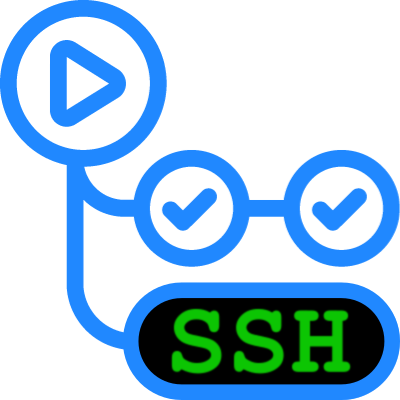GitHub Actions: How to run SSH commands (without third-party actions)
Recently, I’ve been using GitHub Actions for my Continuous Integration and Continuous Delivery. Often, I use a simple deployment process that consists in executing remote commands on the target server.

I found two third-party actions in the marketplace:
Here is what I dislike about them:
appleboy/ssh-actionuses Docker, and therefore, is quite slowgarygrossgarten/github-action-sshfails to report errors- both make it difficult to split a job into multiple steps
Finally, I settled on the following solution: calling the ssh command directly from the workflow.
However, before we can call ssh, we need to configure a few things:
- hostname
- username
- private key
Of course, we’ll not store these values in the source code (at least, not the private key); instead, we’ll use the repository’s secrets.
To do that, we’ll’ begin the job with an additional step that creates the private key file on the runner, as well as an SSH configuration file.
To create the private key file, we simply need to echo the key’s content and make sure we set the right permissions:
$ mkdir -p ~/.ssh/
$ echo "$SSH_KEY" > ~/.ssh/staging.key
$ chmod 600 ~/.ssh/staging.key
To create the SSH configuration file, we could use echo as well, but I think it’s simpler with cat:
$ cat >>~/.ssh/config <<END
Host staging
HostName $SSH_HOST
User $SSH_USER
IdentityFile ~/.ssh/staging.key
StrictHostKeyChecking no
END
As you can see, this file defines the alias staging for the target machine (“staging” is just an example; you can use “deploy”, “production”, or anything else).
To this alias, it binds the hostname, the username, and the private key.
It also sets StrictHostKeyChecking=no to avoid the infamous error Host key verification failed. If you think this is not secure, you can set the target footprint in ~/.ssh/known_hosts the same way we created the private key.
Here is the complete workflow:
name: CI
on: [push, pull_request]
jobs:
# test:
# ...
deploy:
name: "Deploy to staging"
runs-on: ubuntu-latest
if: github.event_name == 'push' && github.ref == 'refs/heads/master'
# needs: test
steps:
- name: Configure SSH
run: |
mkdir -p ~/.ssh/
echo "$SSH_KEY" > ~/.ssh/staging.key
chmod 600 ~/.ssh/staging.key
cat >>~/.ssh/config <<END
Host staging
HostName $SSH_HOST
User $SSH_USER
IdentityFile ~/.ssh/staging.key
StrictHostKeyChecking no
END
env:
SSH_USER: ${{ secrets.STAGING_SSH_USER }}
SSH_KEY: ${{ secrets.STAGING_SSH_KEY }}
SSH_HOST: ${{ secrets.STAGING_SSH_HOST }}
- name: Stop the server
run: ssh staging 'sudo systemctl stop my-application'
- name: Check out the source
run: ssh staging 'cd my-application && git fetch && git reset --hard origin/master'
- name: Start the server
if: ${{ always() }}
run: ssh staging 'sudo systemctl start my-application'
A few remarks on this workflow:
- I deploy only when all tests are passing, hence the commented
needs: testto link thedeployjob to thetestjob. - I deploy only on a push to the master branch; that’s the
ifstatement on the job - I restart the application service even if the other steps fail, thanks to
if: ${{ always() }}on the last step. - I used the
gitcommand on the remote host to check out the code, but instead, you could use thescpcommand to upload a build artifact. - To allow Git to check out the code, I installed a read-only deploy key on the target machine
As you can see, this simple technique allows us to copy files and execute commands on a remote host. Thanks to the alias defined in .ssh/config, we can split a job into several steps with minimal code duplication.